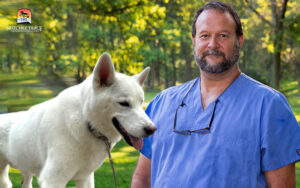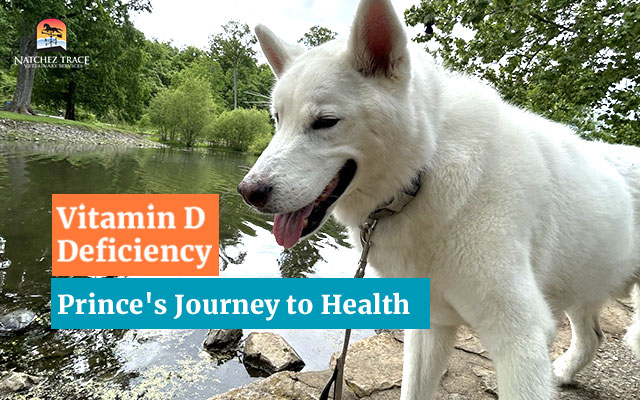While often overlooked, Vitamin D deficiency in dogs is a widespread yet rarely diagnosed health issue that can significantly impact your dog’s well-being.
Approximately 40 percent of dogs suffer from sub-optimal levels of Vitamin D, and the percentage is growing as the canine population ages.
Our dogs can show many symptoms when they suffer from vitamin D deficiency. The three most common symptoms include lethargy, anxiety, and stumbling, but it is also common for dogs to display pain in their hips.
Unfortunately, vitamin D deficiency is often overlooked, and the symptoms are attributed to age-related decline.
Vitamin D helps maintain healthy bones and muscles, relieve allergies, reduce stress, and boost the immune system. Without it, the impact on your dog’s health can be severe.
Prince’s Journey: From Deficiency to Vitality with Dr. Marc’s Care
I just want to take a moment to say how grateful I am for this king. Prince is feeling back up to snuff now, but we recently went through a very scary bout of him having Vitamin D deficiency.
A visit to the vet revealed that though he was improperly restrained and hurt while being dug into with the brush by someone with very shaky hands (at the groomer) the injuries were mostly healed already now, he also had pretty serious Vitamin D Deficiency.
 Our holistic vet, Dr. Marc at Natchez Trace Veterinary Services is so wonderful. He is so skilled at visual observation and runs all the proper tests to confirm his insights. We LOVE Dr. Marc and are so grateful that he was able to get Prince’s test results back SO quickly for us.
Our holistic vet, Dr. Marc at Natchez Trace Veterinary Services is so wonderful. He is so skilled at visual observation and runs all the proper tests to confirm his insights. We LOVE Dr. Marc and are so grateful that he was able to get Prince’s test results back SO quickly for us.
A Vitamin D Supplement was ordered and after 6 days on it, he is already almost back to normal!!! Having been severely D deficient myself in the past, I can only imagine what my sweet pea was experiencing. He was stumbling and getting very anxious and lethargic at times. His hips were bothering him to the point I thought they were giving out. (They are not.)
Prince is 13 and now back to being a total rabble-rouser but also a very good boy. He thanks you all for taking note that this vitamin deficiency is common in dogs as they get older.
Please don’t assume your dog is just getting “too old” and put them to sleep. We still have many more beautiful days to come. When I was deficient I had the same symptoms, and I can only imagine if I had been told I was no longer able to function due to an incompetent doctor.
I’ve seen it happen with friends’ dogs, and I urge you all to be really vigilant about where you take your dogs to see a vet.
Sometimes the Universe provides in mysterious ways. I’m working to let go of the pain that was caused that I cannot control… I know that I’m a good dog mama, and had I known D deficiency was common in older dogs, he would’ve been on it proactively.
– Erin O., Nashville, TN
Signs of Vitamin D Deficiency
Do you know what to look for regarding signs of Vitamin D deficiency in your dog?
 Your dog might be lethargic, have muscle weakness, or severe bone pain. You might notice it is more prone to infections or appear to be “wasting away.” Other signs include hair loss, fatigue, restlessness, allergies and intolerances. Vitamin D deficiency has also been linked to cardiac disease, chronic intestinal disease, and cancer.
Your dog might be lethargic, have muscle weakness, or severe bone pain. You might notice it is more prone to infections or appear to be “wasting away.” Other signs include hair loss, fatigue, restlessness, allergies and intolerances. Vitamin D deficiency has also been linked to cardiac disease, chronic intestinal disease, and cancer.
The signs can be very subtle and occur gradually. As mentioned earlier, vitamin D deficiency is often overlooked, and the symptoms are frequently attributed to age-related decline. If you have concerns about your dog or notice a decline, ask your vet about vitamin D testing.
In addition to physical symptoms, vitamin D deficiency can also change your dog’s behavior. A vitamin D-deficient dog could be more anxious, restless, or depressed. Behavioral changes are often attributed to an underlying issue rather than a nutritional deficiency. To rule out vitamin D deficiency, your veterinarian should conduct a full blood test, and you could also institute a change in your dog’s diet.
Vitamin D is one of the most essential vitamins for your dog to maintain a healthy immune system. It helps ensure your dog’s body responds appropriately when facing an infection or inflammation. In other words, if your dog is vitamin D deficient, it will get sick more easily and have a more difficult time recovering.
Diagnosing Vitamin D Deficiency
 To diagnose vitamin D deficiency, your veterinarian will draw blood to measure your dog’s calcium and phosphorus levels, along with vitamin D, and then conduct a physical exam. Your veterinarian might also consider the type of diet your dog eats and whether or not your dog has access to sunlight. If your dog is deficient, your vet will prescribe a vitamin D supplement, with dosing dependent on the blood test results. Giving your dog the correct amount of vitamin D is crucial because too much can cause toxicity.
To diagnose vitamin D deficiency, your veterinarian will draw blood to measure your dog’s calcium and phosphorus levels, along with vitamin D, and then conduct a physical exam. Your veterinarian might also consider the type of diet your dog eats and whether or not your dog has access to sunlight. If your dog is deficient, your vet will prescribe a vitamin D supplement, with dosing dependent on the blood test results. Giving your dog the correct amount of vitamin D is crucial because too much can cause toxicity.
An ounce of prevention is worth a pound of cure. Give your dog a diet with various nutrients, especially vitamin D, which is abundant in fish, liver, and eggs. If your dog is at risk, discuss supplement options with your vet. And don’t forget to keep up with regular vet visits to help with early detection and treatment.
Doing so will ensure your dog enjoys a good quality of life and its vitamin D levels remain healthy. Watching for signs and taking appropriate preventive measures will help ensure your dog enjoys a long, happy, and healthy life.







